School Is Here Again, and So Is School Anxiety

Every year around this time, kids are heading back to school. Unfortunately, some kids might feel a bit apprehensive. As Julia Martin Burch, Ph.D. writes for Harvard Health Publishing, “…it’s typical for children to experience some anticipatory anxiety leading up to the new school year — and for parents to notice a rise in worries.”
Although many students may not look forward to leaving the freedom of summer vacation, some will have intense feelings of worry and trepidation. This is commonly referred to as school anxiety.
Formally defined, school anxiety refers to when a student experiences excessive anxiety about school. The word excessive is key. Most students will feel nervous about entering a new grade level and making new friends, but it can become a more serious concern when that fear becomes disruptive.
Contents:
- School Anxiety at Different Grades
- Types of School Anxiety
- What Makes Children Feel So Anxious?
- Knowing What’s Going on With Your Child
- How to Help a Child With School Anxiety
- When to Seek Help
- FAQs
School Anxiety at Different Grades
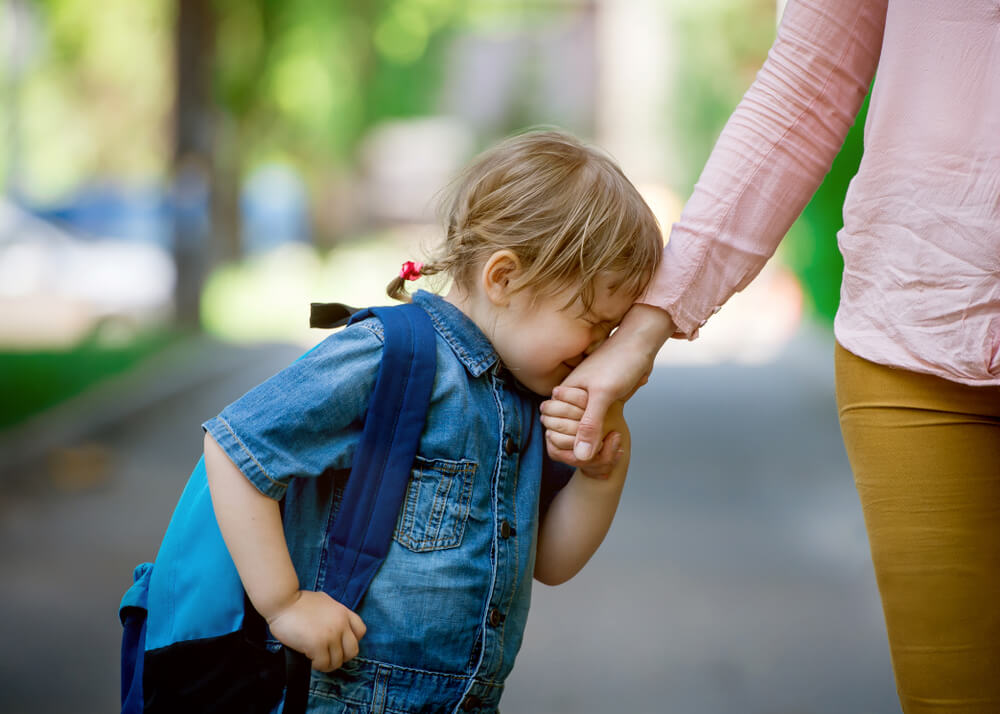
Sharomka/Shutterstock.com
It is quite normal for preschoolers to experience school anxiety, especially as they are being dropped off in the morning. This can be a quite traumatic experience for children at this age. Their memories are not so strong and they may not fully understand that mom or dad will return later in the day.
For children at the primary school level, anxiety at school can center on academic performance. Each grade becomes a bit more challenging and many children simply have not developed proper study habits to perform well.
The cognitive skills of children also grow at varying rates. For some, their brain has just not matured enough to handle the academic challenges found at the next grade level. This can make a child lose confidence and, if not addressed quickly enough, can snowball into a serious situation.
Middle school is a continuation of academic fears but can become worse with the addition of social pressures. As children get a little older, peer relations begin to take precedence in nearly every aspect of their lives. Learning how to form new friendships and navigate pressures to conform can be very intimidating and create a lot of anxiety in students.
High school simply involves everything in middle school times 1,000. It’s a difficult age for most. Teenagers are faced with tremendous pressure to fit in, be “cool,” and be popular. It’s a race that few endure without some kind of mental turmoil. And of course, don’t forget about all those hormones circulating through their cardiovascular system that make things even worse.
Types of School Anxiety
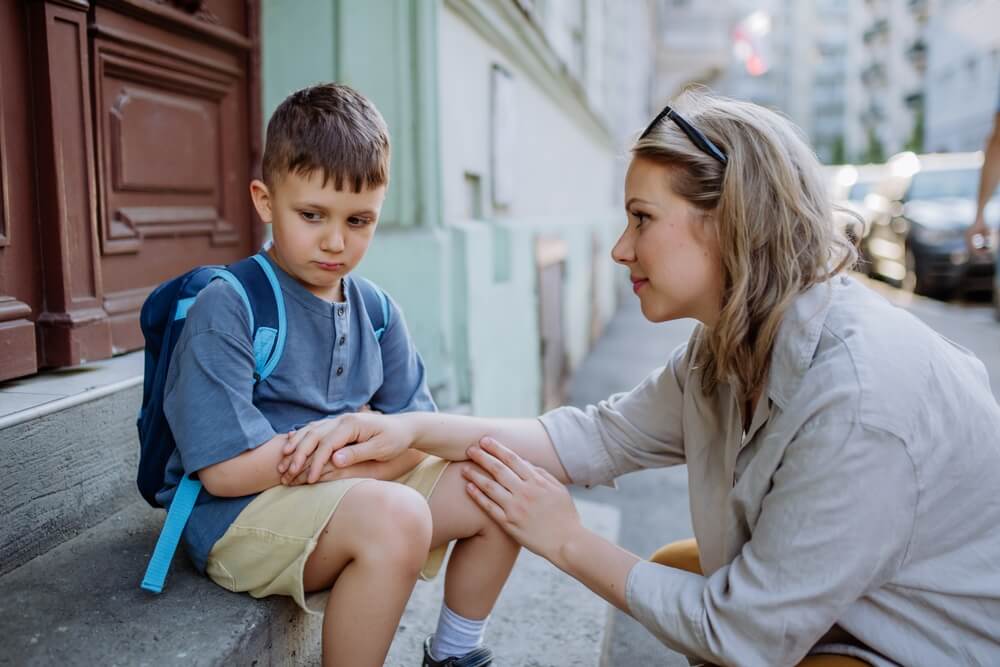
Halfpoint/Shutterstock.com
School anxiety comes in three main forms: school refusal, test anxiety, and social anxiety.
School refusal is the most extreme. This refers to when a child is so apprehensive that they simply refuse to go. Fortunately, early school refusal may not be devastating in the long term.
Case in point, the guy who wrote this article, and spent an extra 9 years in college after high school, actually walked home three times on the first day of grade one.
If it wasn’t for a very patient (and determined) mother, plus the caring attitude of an older, pretty girl who lived down the street, I might never have made it. Thank you, Mom; thank you Mary Anne (if you’re single, leave your number down below).
Test anxiety is another form of school anxiety. As you can guess, this refers to a fear of performing poorly on exams. The fear of failure is a big concern for a lot of children, especially if they lack confidence or have a history of not doing well.
Social anxiety refers to fears related to getting along with classmates. As we touched on before, social pressures become especially pronounced as children progress through the grade levels. It can become so severe that it is debilitating.
In some rare cases, it could escalate into a panic attack or evolve into a formally diagnosed mood disorder such as social phobia, generalized anxiety disorder, or depression. In fact, according to the Centers for Disease Control (CDC), from 2016 to 2019, 9.4% of children ages 3-17 years old were diagnosed with anxiety and 4.4% with depression.
Those percentages might seem small, but when your child is in that group, there’s nothing small about it. So…
What Makes Children Feel So Anxious?

Andrew Angelov/Shutterstock.com
There are several reasons a child might experience school anxiety.
Separation Anxiety
For preschoolers, the fear of being away from their primary caregiver can be one cause of school anxiety. This makes the morning drop-off at school extremely stressful.
The good news is that most preschoolers grow out of separation anxiety in kindergarten. And of course, getting away from one’s parents is usually not a fear for high schoolers. It’s more like a priority!
Academic Performance
One prevailing cause of school anxiety is related to academic performance. Unfortunately, society puts a lot of emphasis on “being smart.” When a child starts doing poorly academically, they feel like a failure. This feeling can be internalized and become part of a child’s self-identity.
A lot of children have not learned good study habits and go into exams feeling completely unprepared. As those fears materialize into poor performance, it can become a self-fulfilling prophecy. The good news is that it’s a cycle that is fairly easy to break. More on that later.
Social Dynamics
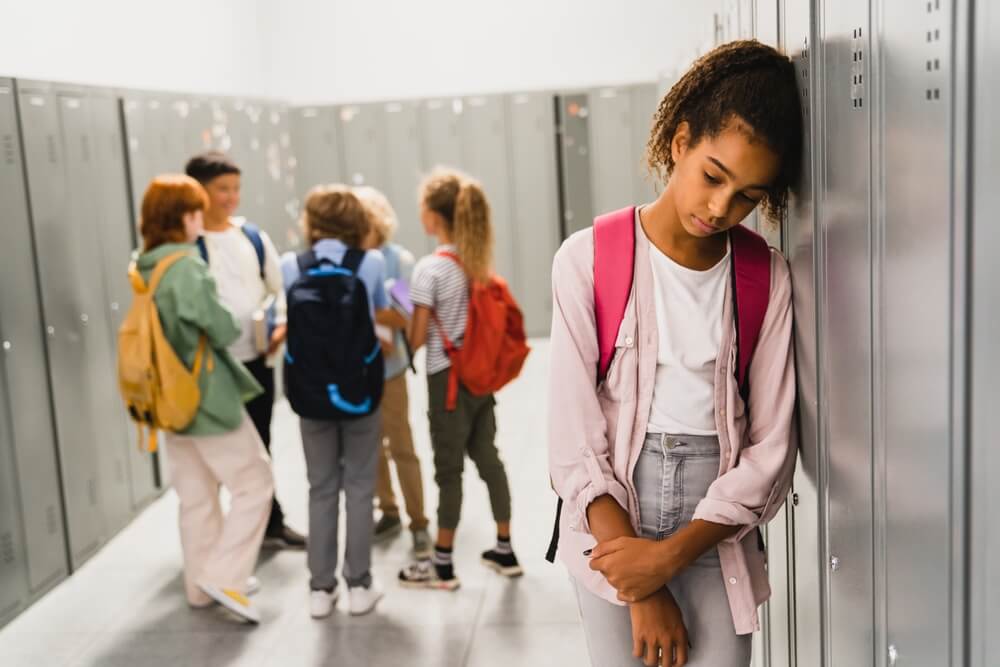
Inside Creative House/Shutterstock.com
Social fears are a bit more complicated and difficult to overcome. This can be especially true for children that are already timid or socially awkward. Watching a child have these struggles can be a painful experience for parents. Luckily, as mentioned below, there are some solutions.
Similarly, bullying and harassment from classmates are another cause. This is a serious matter that many teachers have been trained to deal with. While that training can be very thorough, parents also need to be vigilant and look for signs of bullying in their child’s behavior and emotional disposition.
Physical Health Factors
There are a range of health-related issues that can cause school anxiety. On the less severe end of the continuum are matters related to visual acuity, lack of sleep, poor nutrition, or even severe allergies. Any of these factors can affect performance at school.
Neurological conditions
On the other end of the continuum, school anxiety can be caused by neurological impairments that have been linked to autism spectrum disorder or attention deficit hyperactivity disorder (ADHD).
Related: A Child’s Fear of School: Everything You Need to Know About Scolionophobia.
Knowing What’s Going on With Your Child

Evgeny Atamanenko/Shutterstock.com
When parents are busy it can sometimes be easy to not notice subtle changes in their child’s mood or behavior. Days are jam-packed with long to-do lists and demands at work can easily carry over to home. This can give parents a bit of brain fog even when they’re no longer at work.
So, it can be helpful for parents to know some of the more common symptoms of school anxiety. Knowing what to look for can make symptoms easier to spot.
Symptoms of School Anxiety
Here is a list of common symptoms of school anxiety.
Physical Symptoms
- Signs of physical distress such as sporadic breathing or sweating.
- Experiencing gastrointestinal symptoms such as a stomachache or nausea.
- Headaches, feeling lightheaded, or showing signs of dizziness.
Emotional Symptoms
- Repeatedly expressing fears or worries about the school day.
- Becoming unusually quiet when parents talk about school.
- Being unusually irritable; things that wouldn’t normally be an issue all of a sudden seem to strike a nerve.
- Having nightmares.
Behavioral Symptoms
- Pretending to be sick.
- Throwing a temper tantrum or crying spell.
- Generating various reasons regarding why they don’t need to attend school.
- Secretly missing school without excused absences.
Can the Findmykids App Help?
If your child is old enough to have a smartphone, then the Findmykids app can help. The app is a great way to locate your child at any time. This can be extremely important in an emergency.
The app also has a location history option so that a parent can see where their child has been throughout the day. If you want to make sure your teenager is actually going to school, and staying at school, then this is an excellent option.
If you are concerned that your child is keeping the wrong company, the app also has the ability to listen to their surroundings. This allows parents to know what kind of social circle their child is in and if that is a good thing or not. You can never be too careful these days.
When some students get depressed, they might use certain apps that are related to feeling depressed, or even suicidal. In this case, the Findmykids app can be used to see which apps your child has been using and for how long.
Whether you think these options are too intrusive or not is entirely up to each parent. Every family situation is different and ultimately the parents are responsible for the welfare of their children.
For those who are too young to own a smartphone (preschoolers, younger students), we recommend choosing Pingo Track kids’ watches. When purchased from an official representative, you will receive a free license for the Findmykids app! This means that all the features we mentioned before will be available to you.
How to Help a Child With School Anxiety

Africa Studio/Shutterstock.com
First, if you have observed some minor symptoms in your child that make you feel concerned, even if it’s just a little, then don’t wait. Minor symptoms could be a manifestation of something happening at a deeper level.
Of course, identifying the cause determines the strategy for helping.
For academic-related anxiety, there are several things a parent can do. For example, hiring a very good tutor can turn the situation around by directly improving the child’s academic abilities.
A good tutor will also show a student how to study more effectively. This includes tips such as:
- Incremental studying a little bit every day instead of cramming
- Creating flashcards
- Learning how to identify key points in a lecture or text
- Only highlighting key phrases, not entire sentences
For anxiety related to social issues, parents have several options before seeking a trained and qualified professional:
- A few weeks before school begins, have some conversations about what to expect and how to handle different situations
- Consider taking a trip to the school before the academic year begins; walk around the campus if you can and try to highlight the fun things that can happen at school
- Be calm and reassure your child that you are on their team and they have your full support
- Once school starts, set aside sometime after school to talk about their day; focus on social dynamics if that is at the heart of your child’s anxiety. Dr. Rome and Dr. Austerman from the Cleveland Clinic suggest using questions like these to help frame the conversation:
- “What was the funniest thing that happened today?”
- “What was the best part of your day….and the worst?”
- “Who did you sit with at lunch”?
- Connect with their teacher to gain a more comprehensive understanding of what is happening at school; again, if social dynamics are a concern, focus some of your discussion with the teacher in that domain.
Read also How to Deal with a Child Misbehaving at School: Tips for Teachers and Parents.
When to Seek Help
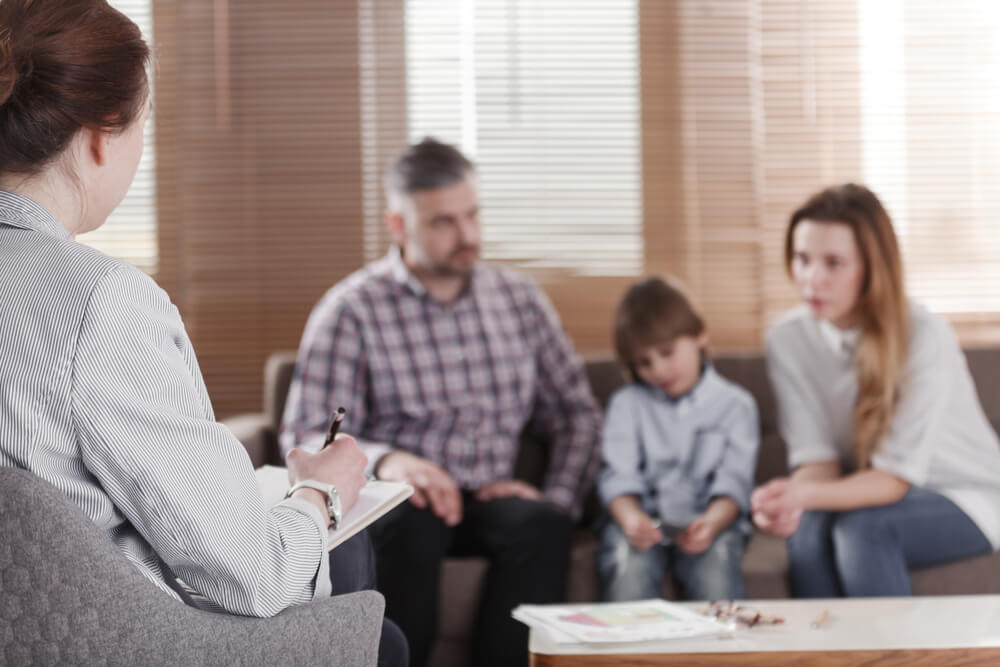
Ground Picture/Shutterstock.com
Although nearly all children experience some anxiousness about going to school at some time or another, if it is sustained over a period of several weeks, then it may be time to get outside help.
It’s better to seek help when you first notice significant changes in your child’s demeanor and performance at school. School anxiety is more manageable early on than when it builds into something more substantial.
Contact the school’s counselor for referrals. Your pediatrician may also be another good source.
Final Remarks
Nearly every child in human history has been reluctant to go to school at one time or another. This has been a part of most of our childhoods. But as modern society has led to greater amounts of stress and anxiety, it’s important that parents be observant. Be vigilant and look for signs of stress.
In addition, try to learn as much as you can about your child’s experiences at school. This can be accomplished by asking them questions about their day or talking to their teachers to gain additional insights.
However, if your child shows certain emotional, physical, or behavioral symptoms for weeks in a row, then consider contacting a qualified professional. The school or your pediatrician can provide referrals.
FAQs
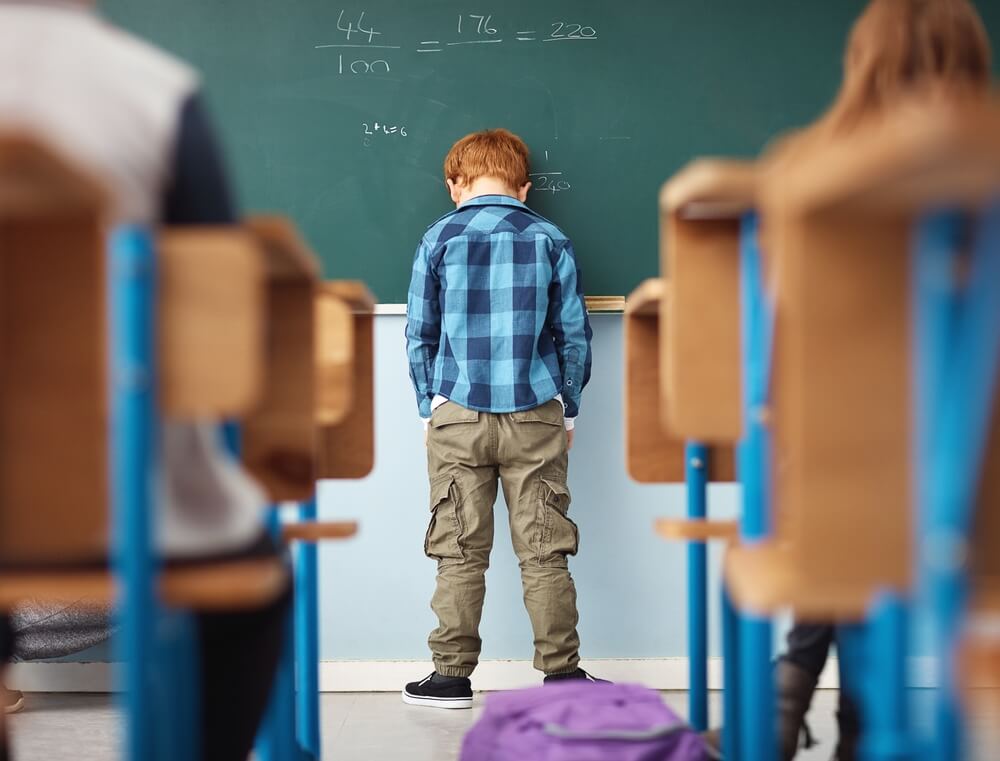
PeopleImages.com – Yuri A/Shutterstock.com
What is school anxiety like?
For each child, it can be different. Some children will have trouble sleeping, lose their appetite, or experience nausea and stomachaches. For other children, they might express their anxiety by throwing temper tantrums and crying spells.
What are three things that can cause anxiety in school?
Bad grades, social pressures, or bullying, just to name a few. Some children have not developed good study habits, so the fear of failing exams is real. Older kids can endure a lot of pressure to fit in certain social groups. And sometimes shy children will become the target of bullies because they seem like easy prey.
What is the 3-3-3 rule for anxiety in children?
The 3-3-3 rule is a coping strategy that can be used in a critical anxiety-provoking moment. In its simplest form, it goes like this:
1) Focus on three things in the environment that you can see.
2) Identify three sounds you can hear.
3) Move or touch three things.
This is a way to distract the mind from the situation causing anxiety. It’s best for a child to practice it a few times at home when not feeling anxious so that they know what to do when they encounter that stressful moment.
The picture on the front page: DGLimages/Shutterstock.com
Проверьте электронный ящик





















